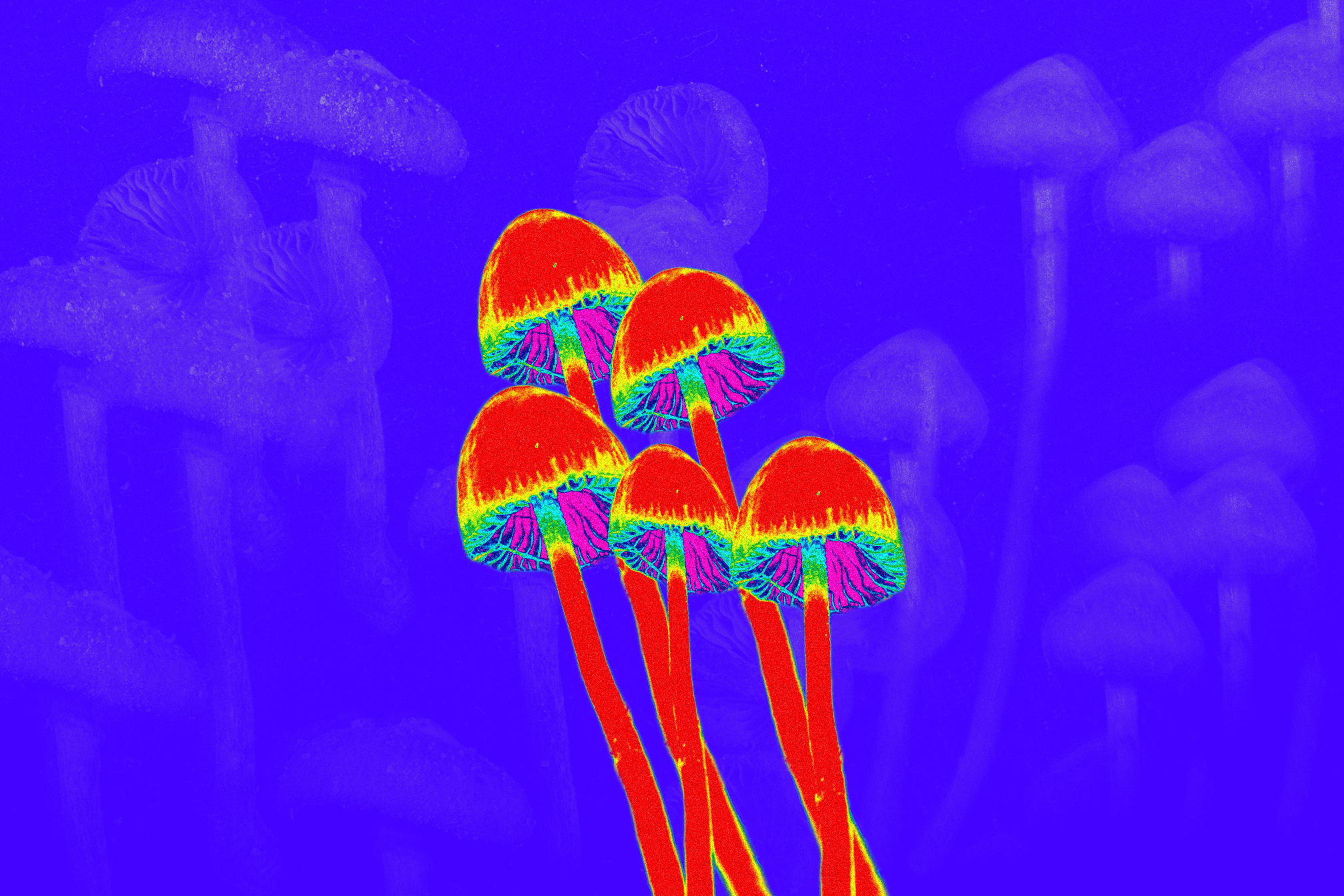 Features
Features
The magic mushroom renaissance
Magic mushrooms are back! Joe Roberts charts the history of psilocybin and explains why shrooms are having a medical and cultural renaissance
The global pandemic of 2020 has exposed the divided state of much of our world. And against this, Oregon’s Ballot Measure 109, which saw the state become America’s first to vote to legalise the "manufacture, delivery and administration" of psilocybin, the active ingredient of magic mushrooms, seems like a minor footnote – especially as it was overshadowed by the the presidential election that took place on the same day.
Yet it’s potentially part of the prologue to a new chapter in mankind’s understanding of consciousness and holistic health, both individual and societal. Whether this ultimately bears out, at present it marks the high water mark of a year in which psilocybin has worked its way deep into the public (sub)consciousness – at the same time as being widely consumed through homegrown crops, micro-dosing kits, vials of dark liquid extracting psychedelic potency into aged rum and bars of chocolate, one Kit-Kat branded bar encouraging consumers to ‘Take a break… from reality.’
It’s a movement that has been building momentum for some years. There have been articles about microdosing mum’s in The Guardian; Michael Pollen’s 2018 book How to Change Your Mind: What the New Science of Psychedelics Teaches Us About Consciousness, Dying, Addiction, Depression, and Transcendence,a New York Times best-seller, brought stories of psychedelics, both as underground therapy and the potential future of science-endorsed medicine, into the mainstream; and this year’s Mushrooms: The Art, Design And Future Of Fungi exhibition at London’s Somerset House, which heavily repped the psychedelic variety, featured hip Australian clothing brand Perks And Mini, whose ‘Psy Life’ branding has always been building to an eco-friendly tie-dyed magic mushroom t-shirt based on Black Flag’s logo.
Read this next: Buchla's LSD time trip
Then there’s American mycologist, author and star of documentary Fantastic Fungi, Paul Stamets, who podcast king Joe Rogan called one of his most requested guests when he first appeared on his show in 2017. With an origin story involving taking his first magic mushroom trip at the top of a tree during a thunderstorm, curing his teenage stutter, his promotion of the healing properties and applications of mushrooms of all varieties includes the patented BeeFriendly™ fungus feeder, which seeks to solve the problem of bee colony collapse. His Stamets’ Stack, meanwhile, outlined in another 2017 talk, is a nootropic combination of psilocybin, Lion’s Mane, and niacin he says aids the brain’s neuroplasticity, via neurogenesis. Believing it could help ailments from Alzheimer’s to hearing loss, his vision is of psilocybin being taken like a vitamin.
It’s underpinned by Stamets’ revival of the Stoned Ape hypothesis, an idea that the rapid doubling of human brain capacity which occurred 200,000 years ago, and our accompanying rise in intelligence, was driven by the consumption of magic mushrooms – a story that illustrates the enthusiasm behind what many see as mankind’s symbiotic relationship with psychedelic fungi. It was a concept first published in 1992’s Food Of The Gods by Terence McKenna. A celebrated American ethnobotanist, psychonaut and author, the talks he gave before his death in the year 2000, delivered in a distinctly hypnotic and gleeful voice that made even the most outlandish claims sound plausible, have probably done more than anyone else to popularise the history and potential of psilocybin for personal and social transformation.
Through this seeming ubiquity, mushrooms containing psilocybin, the ‘magic’ part, are still illegal in the UK and most of the US, having been previously decriminalised in Denver, Colorado, last year and then more recently in Oakland and Santa Cruz, both in California. Prior to 2005 it was legal to sell fresh magic mushrooms in the UK, meaning head shops were providing curious teens with a rites-of-passage that has endured from its first recorded instance 10,000 years ago in sub-Saharan Africa all the way through to modern Middle England suburbia – that first perception-altering mushroom trip.
The Drugs Act 2005, enacted by Tony Blair’s Labour government, outlawed this and made them a Class A drug, justifying it in a statement, that called magic mushrooms a powerful hallucinogen that “can cause real harm, especially to vulnerable people and those with mental health problems.”
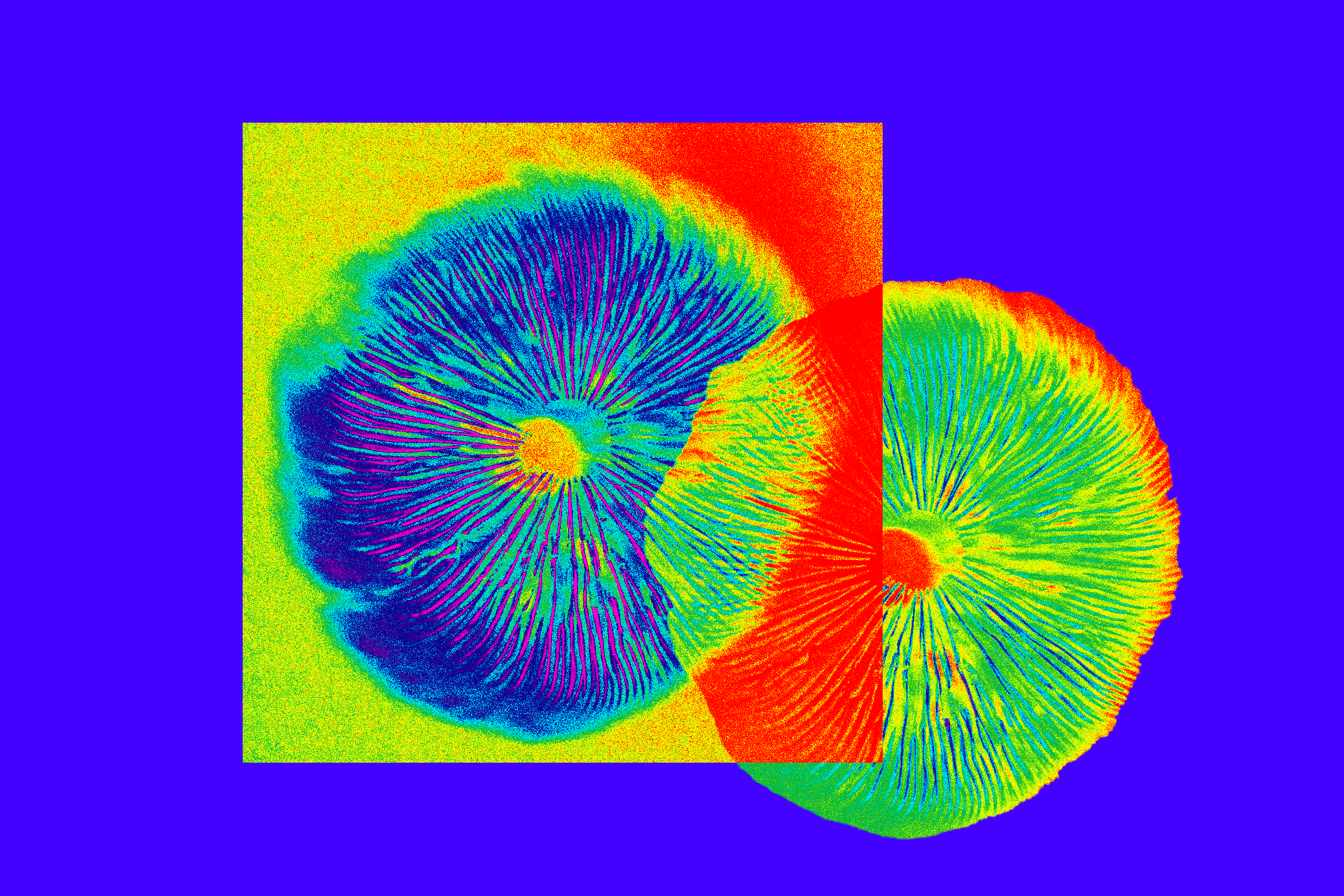
Yet it’s now mental health problems, such as depression, addiction and PTSD, that psilocybin mushrooms are being trialled, in a guided clinical setting, to treat in the UK. King’s College was recruiting this summer to test ‘The Safety and Efficacy of Psilocybin in Participants with Treatment-Resistant Depression (P-TRD)’. Imperial College, meanwhile, last year launched The Centre For Psychedelic Research and are currently running a similar psilocybin trial. America’s John Hopkins University, who revived government-endorsed psilocybin trials back in the year 2000, also opened up a dedicated Center for Psychedelic and Consciousness Research last year, with two leads trials testing psilocybin in treating opioid addiction and PTSD.
As Pollen’s book comprehensively lays out, the knowledge that psychedelics can make long-lasting changes to deeply ingrained behaviour, often from just one experience, isn’t new. What is happening now follows up scientific research done in the 50s and 60s before hysteria over LSD and other psychedelics, once used legally as therapeutic tools by pioneers such as Stanislav Grof, led to it being buried.
Reported in Nature, early UK trials showed remarkable results for ‘treatment-resistant depression’ – patients still depressed after using two or more traditional antidepressants – with psilocybin seeming to ‘reset’ patient brains. As Dr Robin Carhart-Harris, head of the Imperial Centre for Psychedelic Research, announced when it opened: “This new centre represents a watershed moment for psychedelic science; symbolic of its now mainstream recognition. Psychedelics are set to have a major impact on neuroscience and psychiatry in the coming years.”
Read this next: How drugs won the war on drugs
“The UK leads the world in research on the use of psilocybin,” says Professor David Nutt, who also works at Imperial, on the good news when we talk, adding it’s being trialled to treat OCD and anorexia too. Famously fired as a government advisor in 2009 after a multicriteria decision analysis he did of drug harms declared LSD and ecstasy safer than alcohol and tobacco, he also previously ruffled feathers by pointing out horse riding, or ‘equasy’ as he satirically branded its ‘addicts’, is statistically more risky and harmful than taking MDMA. Magic Mushrooms, his analysis concluded, were the least harmful of all drugs considered.
His argument, then as now, is that drug policy is based on misguided politics rather than led by rational science and research. The illegality of psilocybin, despite it appearing completely safe from recent studies, makes it costly and difficult to obtain – and the bad news is he doesn’t see this changing under our current government. He’s optimistic, however, that there will be some kind of licensed treatment in five years.
The absurdity, for those desperately awaiting the official rubber stamp of approval, is that a huge self-experiment is going on across the world, as indeed it has for thousands of years, and the anecdotal results are already in – magic mushrooms are the gateway to another world, both metaphorically and, according to many users, literally.
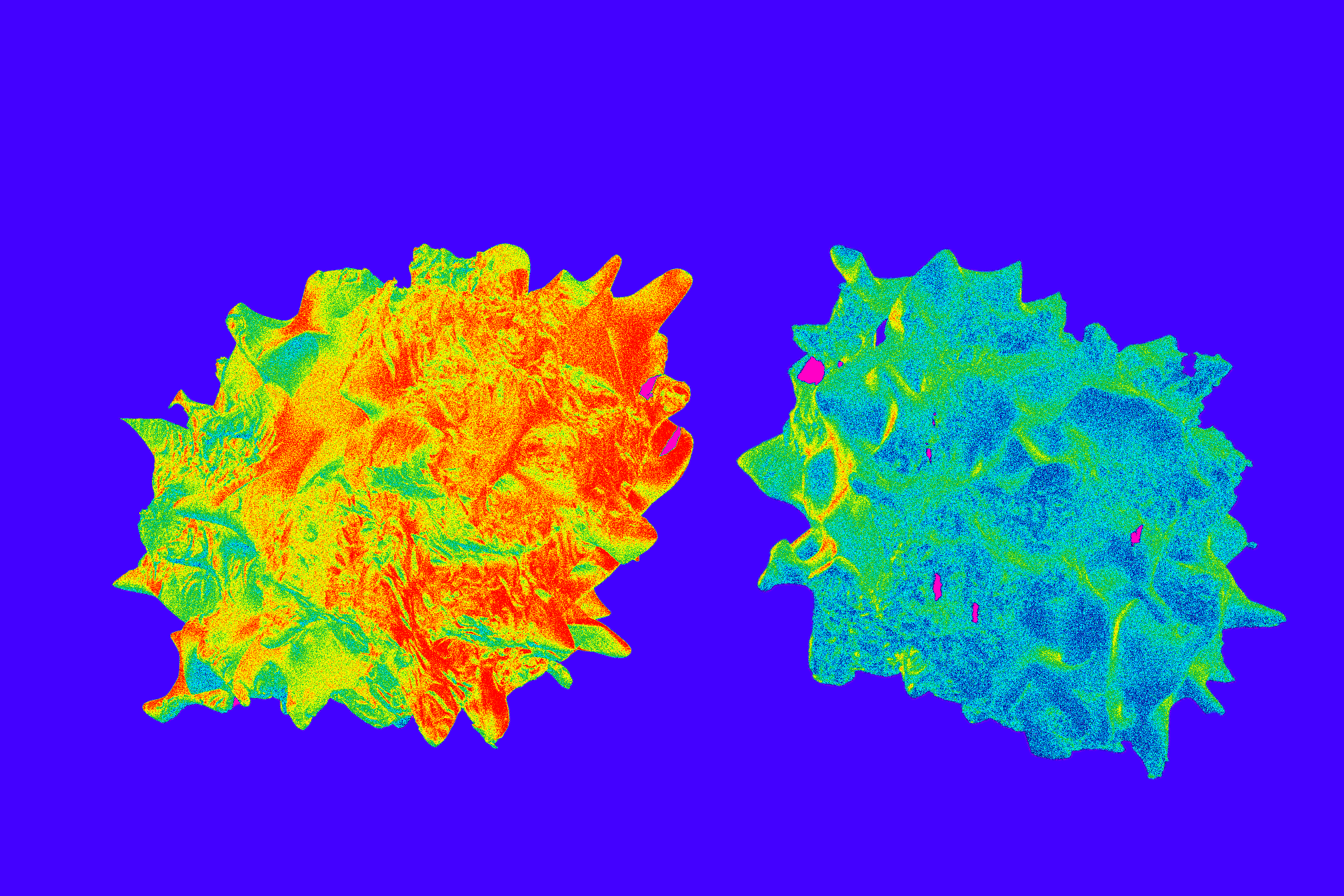
Part of this renaissance is that they’re dose dependent. The mum on the school run, the clubber at a rave and the seasoned psychonaut preparing for a night of soul-searching visions and personal revelations have all ingested psilocybin, but their intention for taking it and their experience will drastically differ.
Eris Drew has spoken openly about using magic mushrooms, both inside and outside of clubs, recently tweeting advice on how to activate visuals on mushrooms and writing in detail about her take on them, “as a tool for transcendence, connection, and creation”, in a piece for Never Apart. “They’re definitely back and on the scene and people are using them, both artists and dancers,” she tells us when we call her at her New Hampshire home.
For some they’ve become an alternative to what Eris calls “white drugs”, although they’re also sometimes used alongside them. Creating a warm, open feeling when taken in doses of around a gram, mushrooms are to all intents non-toxic – unlike other, potentially adulterated, drugs, such as cocaine. Though higher doses certainly have the potential for mental distress, Eris notes Burning Man’s Zendo Project, which bills itself as ‘Psychedelic First Aid for Festivals’, is an excellent resource offering training to parties on dealing with this. (This year’s Burning Man took place in cyberspace, with Paul Stamets giving a talk on a stage called The Mushroom, whose cap was actually a UFO – nodding to two of Terence McKenna’s greatest interests.)
Read this next: How British cocaine dealers got faster and better
Microdosing, the practice of taking small amounts of magic mushrooms, usually one tenth of a typical trip, so around 0.3 grams, appeared to have become more popular during lockdown and had already been covered by virtually every major news sources over the last few years, with even the Daily Mail giving it a positive spin. Popular in Silicon Valley, where Pollen reports it originated with LSD, the idea is to just tickle perception – leading to improvements in mood, concentration and creativity without interfering with everyday functioning.
Producer, remixer and graphic designer Leo Zero, now nearly 50, had what he calls a “minor breakdown’ in 2002, suffering a bout of depression he managed to overcome – after rejecting antidepressants, which made him feel like he was on an E – via getting fit and self-help books. The experience made him “a searcher”, leading him by way of meditation and a growing spirituality into using various plant medicines.
“I can get really technical with microdosing,” he says of his own practice of using mushrooms before going into his home studio, usually early in the morning. “You’re not thinking, you’re just doing. You enter into a hyper-precise frame of mind.” As well as getting lost in the process, he says it has also helped remove his self-doubting ego. “Music making is a confidence game. Tying yourself up in knots about whether people will like it is such a waste of energy. The massive gift is getting that energy for your creativity.”
A new study in the British Journal of Psychology reports there has been a steady increase in generalised anxiety and depression in the UK since the 2008 financial crash, a trend undoubtedly boosted by 2020’s events. Microdosing seems to have become a self-medication for our ‘wellness’ times, thanks to being natural and decidedly anti-addictive, unlike many illegal/legal drugs and prescription medications.
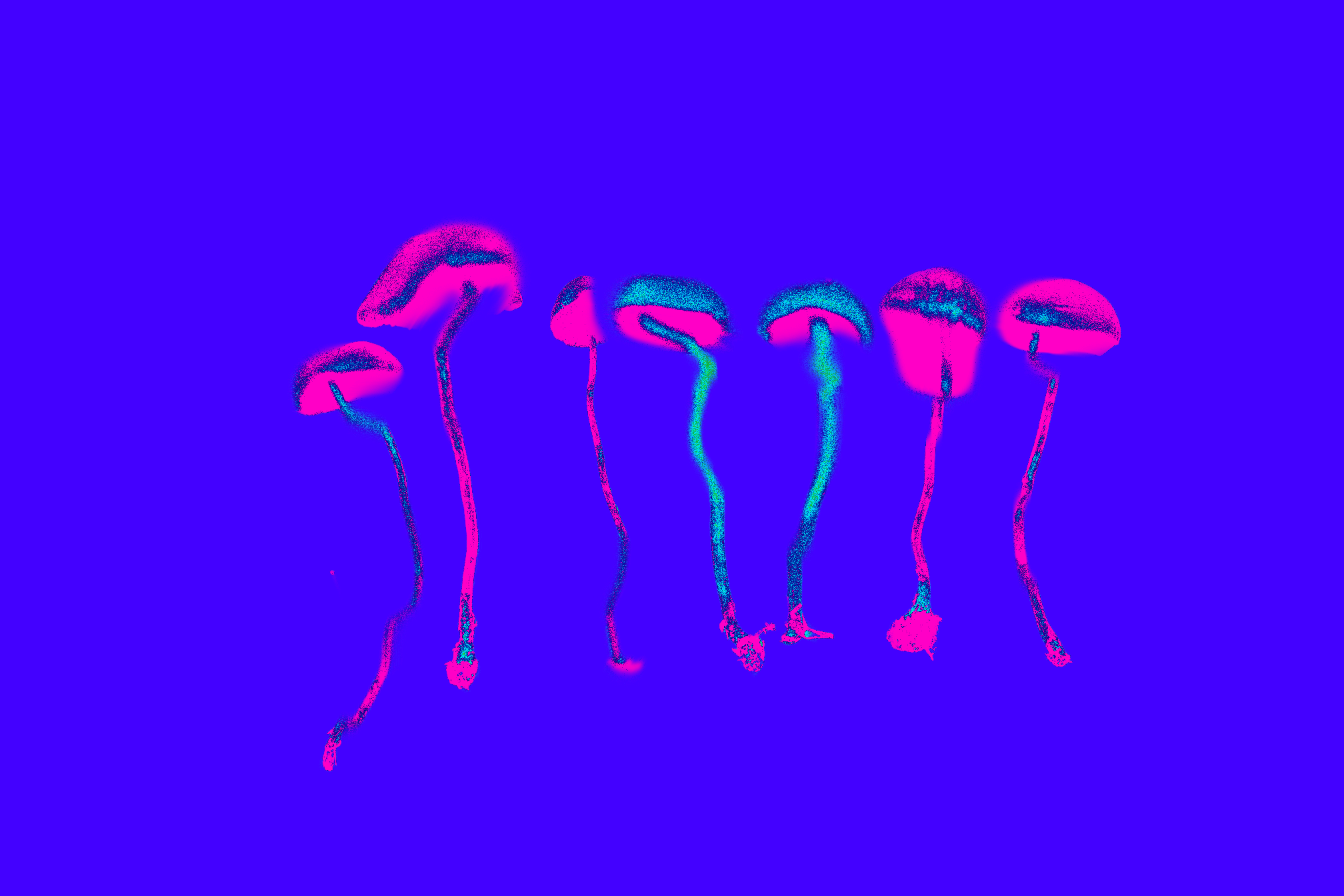
“It helped me remain more calm, less anxious through the intense lockdown we had,” says one Ibiza-based DJ we speak to, adding it also reduced his consumption of other drugs. Another tells us: “I’m a person who lives almost entirely in my own head – eternally lost in spirals of negative thoughts – and when I started taking regular, small doses of magic mushrooms I suddenly began to look out into the world and it felt so, so good.”
Given its huge swathes of positive press, microdosing’s momentum seems to still be growing. But science is on hand, as always, with a caveat: “At present there’s no evidence it’s anything other than placebo,” says Professor Nutt, adding there haven’t been any proper studies due to psilocybin being Schedule 1.
Many are venturing, often alongside microdosing, into the realms of what science is delving into: a full mushroom trip with the emphasis placed on going inside. Others are going even further with what McKenna labelled a ‘heroic dose’, five dried grams of mushrooms and above.
In 2016, The Juan MacLean, Brooklyn-based DFA affiliate John MacClean, was at the height of his career. Sober and in 12-step recovery, which he says saved his life after battling a heroin addiction that lasted until his late 20s, on the outside he had it all and was “doing all I was supposed to”, including following a practice of yoga and meditation. Yet he couldn’t shake an underlying depression that left him feeling, “if this is all there is in store for the rest of my life, I’m just not interested in living anymore”.
Read this next: The best films about cocaine
Taking part in an ayahuasca ceremony in Peru, after playing a festival in Mexico, shattered what he’d learned about the disease model of addiction, reaching for the first time to the roots of his unhappiness and harmful drug use by communicating with something that told him he could stop being an addict if he really believed he could stop being an addict. “My life changed that week dramatically.”
He’s gone on to develop a home mushroom ceremony that fulfils the same purpose, lying down with an eye mask on and listening to ambient music to keep external influences to a minimum. “It not only keeps it away,” he says of the depression he thought would never leave, “I just no longer have those addictive impulses anymore.” His creativity, he adds, has multiplied exponentially.
“They awaken your own healing powers,” agrees Nightwave, aka Glasgow-based Maya Medvesek, who emphasises having an intention going into such experiences. She says using high doses of mushrooms have aided her spiritual awakening, adding depth to her Buddhist practice, and helped deal with the pitfalls of being a touring DJ and life in general, “anxiety, depression, grief, just functioning”, she laughs.
“People often have a nightmare experience in their 20s, then never do psychedelics again,” reckons John on the aversion some have to the idea, despite using other illegal drugs. But the experience, he says, is hugely different with “some kind of way to contain or contextualise it”. He sees a counselor trained in integrating psychedelic experiences and this process, which typically means a break of many months between journeys, is emphasised again and again. “Integration is figuring how to put the revelations into action in your life,” explains Charlotte, a TV exec and yoga teacher who helps on retreats.
Beyond individual stories, the re-emergence of magic mushrooms perhaps offers the opportunity for wider societal transformation. Akua Ofosuhene, a 50-year-old dress maker, gave a talk at last year’s Breaking Convention, an annual psychedelic conference in Greenwich, South London, entitled Can Psychedelics Change Our Racist World Order?
Born in the UK, she moved to Ghana when she was pregnant, returning here six years ago when her mother became ill. After her son became involved in county lines drug dealing, using mushrooms, both microdosing and in larger doses, helped her to negotiate it. “Doing a big flood dose, you can go in with a question,” she tells us, saying she’d needed something that gave faster solutions than counselling was. “You think you know the answer, but you don’t know what it is you need to cure inside yourself first. That’s how mycelium works, it triggers lots of other knowing.”
She sees a straight line from the European legacy of racism back to earlier forms of class and gender subjugation, dispelling the myth that a distrust of strangers is innate by pointing to indiginous tribes who welcome outsiders. “I think we have to start the work on the inside, individually,” she says. “If you can’t try and erase the division in yourself, I think everything else becomes affectation – it’s all about somebody else doing the work, somebody else making things right for you. If you start doing the work on yourself, you free yourself to have more solutions.”
Akua also points us to Kilindi Iyi, an advocate of using extremely high doses of mushrooms: 20 grams and beyond. Tragically dying of Covid-19 in April, Kilindi Iyi brought an afrocentric knowledge and perspective to the world of psychedelic speakers. A head instructor and technical advisor of the Tamerrian Martial Art Institute in his native Detroit, teaching ancient and contemporary African fighting sciences, which he believed had their own psychedelic history, his charismatic talks leave a legacy of knowledge that reaches across history and deep into hyperspace – explicitly exploring the ‘magic’ of mushrooms with a commanding zeal and authority. It was his belief we’ve entered a new psychedelic age and his hope that “mushrooms can lead the human being into some form of mature sanity, leaving behind the immaturity of the last twelve thousand years.”
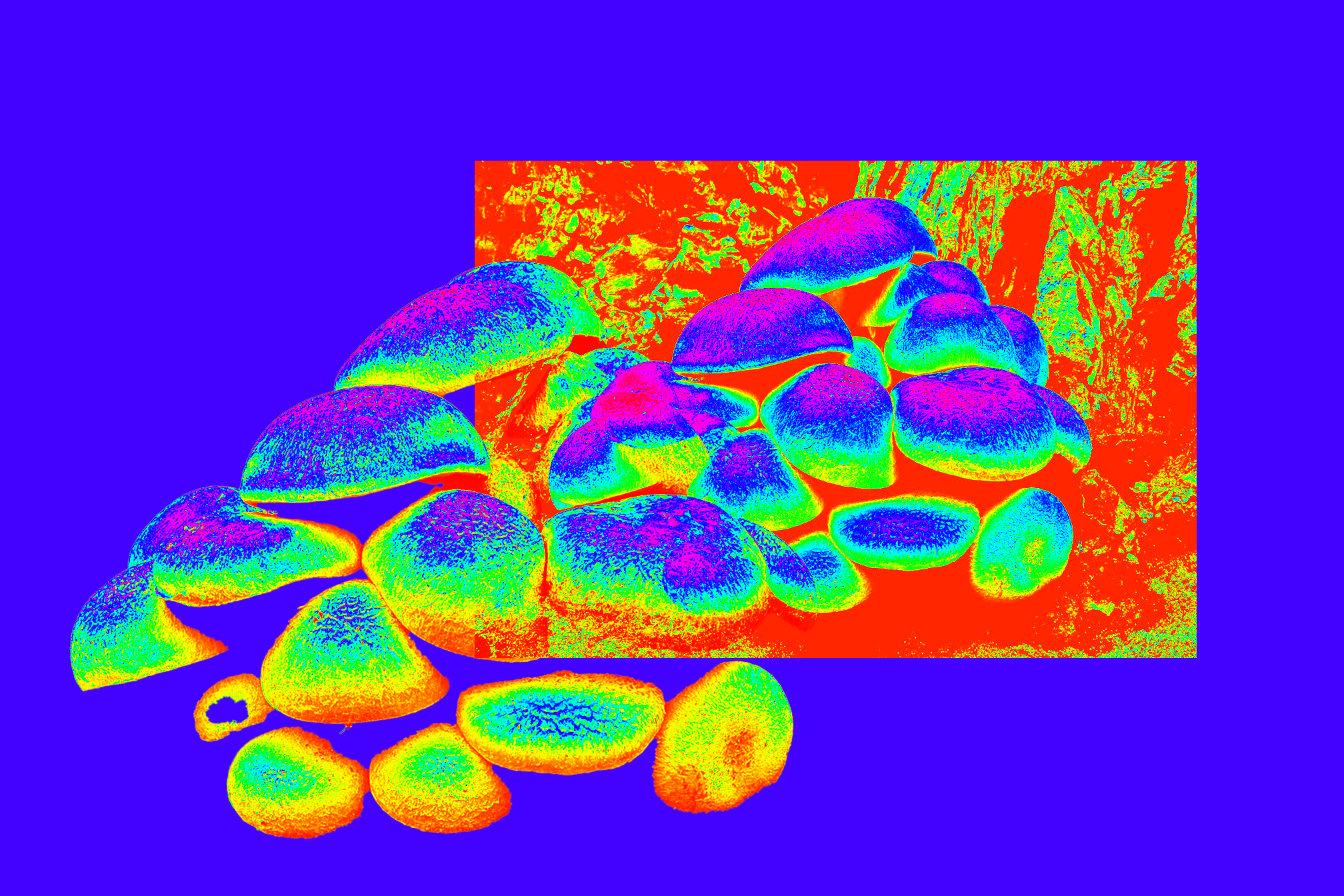
In 1992, as well providing an eschatological monologue for The Shaman’s ‘Re:Evolution’, Terence McKenna came to London and gave a talk at The Camden Centre. “These psychedelic substances cause hysterical psychosis in people who have not taken them, and how then do you talk them down out of their tree and attempt to convince them that this is all well and good?” he said, a joke riffing on the widespread fear the anti-psychedelic propaganda of the 60s had left. “Well, it isn't easy. It isn't going to come from the upper echelons of the establishment, this revolution in thinking, it's going to come from youth, it's going to come from people who stand outside the system and can see its contradictions.”
It’s a sign of how entrenched the establishment is that in 2020 this revolution encompasses a movement that has at one end empirically-minded scientists who believe in materialism and at the other astral-journeying psychonauts who believe in machine elves. Yet they’re saying the same thing: magic mushrooms help induce deep and radical transformation for the better.
They’re also undoubtedly part of youth culture again. Leo Zero points us to psychedelic fanzine Weird Walk, whose ‘Stone Circle’ stickers are based on the Stone Island logo and who have a show on NTS, while Eris says she’s seeing mushrooms on record artwork for the first time since the 90s. But as Pollan's book underlines, psychedelics are also being embraced by older people who’ve done the things society expects of them, yet still feel a kind existential emptiness.
“We’re living in a time of duality and binary thinking that is literally out of control,” says John on the current political polarisation between left and right. “Psychedelics are really good at helping people break out of binary thinking. Especially the classic ego destruction, where you have a very direct experience of ‘I am not separate from anything or anyone else.’”
Gaining scientific approval is key to them reaching some people who wouldn’t otherwise benefit, but Eris believes that this deconstruction and decontextualisation of the mushroom experience has its limits. “Personal experience, subjective experience, doing these things in communities is extremely important. We can’t just seed this shit to the government and profiteers.” Others are working to take this experience beyond its traditional realms. Teresa, who has a background in mental health and now works with psychedelics, describes plans to bring wellness education into businesses – with the idea of also offering retreats using psilocybin in Portugal, where drugs are decriminalised. “Our niche is start-ups, so they’re already quite open. It could make such a difference to the world if people who employ lots of staff are able to understand things in a different way. It would have such a knock-on effect in society.”
Mycology as a whole also seems to be sharing the limelight, opening the doors to those who wish to take matters into their own soil-covered hands. “I fell in love with the whole fungi kingdom and became completely obsessed,” says one grower who makes mushroom chocolate. He tells us his next step is selling extracts from legal mushrooms, listing Reishi, Lion’s Mane, Chaga and Cordycep as some of the varieties that are hugely beneficial to human health, in part because mushrooms are more closely related to animals than they are plants. Good sterilisation, he says, is the key to growing your own, advising the PF Tek method as the simplest way to start growing any kind of fungi.
Read this next: The history of acid house in 100 tracks
It feels like the beginning of a new age, but we’ve been here before. "They're selling hippie wigs in Woolworths, man,” drawls Danny, the kohl-eyed dealer in Withnail And I. “The greatest decade in the history of mankind is over.” A classic British tragicomedy about two drop-outs trying to straighten out, its backdrop is the end of the 60s and the loss of innocence of the first psychedelic generation – the long-haired symbol of LSD-fuelled youth rebellion, immortalised by 1967’s ‘Summer Of Love’ in San Francisco, commodified by capitalism.
With the film released in 1987, it was just a year later that the ‘Second Summer Of Love’ hit the UK. Acid house was driven by ecstasy, but the echoes of psychedelic revolution were still there, LSD proselytiser Timothy Leary’s voice traversing the decades – sampled on tracks such as Eøn’s ‘Light Color Sound’ and Psychic TV‘s ‘Tune In (Turn On The Acid House)’. The 60s smiley was reborn as a symbol of E positivity, but it soon became emblematic of acid house’s commercialisation, the subsequent era of the superstar DJ laying the foundations for the disparities and abuses of the pre-Covid electronic music scene.
Some have hailed 2020 as the third Summer Of Love, psychedelic drugs again mixing with illegal parties against a backdrop of extreme social and political unrest. But coronavirus adds a unique and divisive element. Instead of joining together in communal abandon, most are at home undergoing an introspective and isolated revolution. As such it feels more apt to borrow the parlance of our times, calling what is happening the third wave of Western society’s attempt at psychedelic-aided evolution. Is it ready, this time, to wake up and taste the mushroom?
Joe Roberts is a DJ, producer, freelance journalist and regular contributor to Mixmag. Follow him on Twitter
Read this next: Get the best of Mixmag direct to your Facebook DMs



